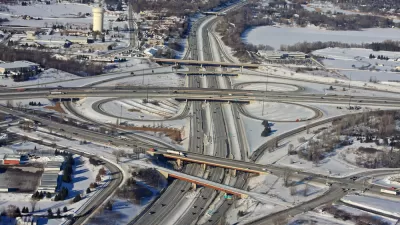Even as density increases in Minneapolis, affordable housing is not going to be accessible to the people who need it, according to an article by James S. Russell.

While the Minneapolis 2040 plan took the bold step of ending of single-family zoning, housing is still out of reach for the city’s low- and moderate-income residents, writes James S. Russell. Allowing multi-unit buildings throughout Minneapolis will increase density, but rents are still on the rise and poor people are being displaced.
"The Minneapolis plan only indirectly addresses the needs of those low-income residents, relying on the market to lower rents by adding to the supply. While developers are already eyeing single-family houses to convert to duplexes and triplexes, many experts believe there is little evidence that adding market-rate units will have a trickle-down effect in thriving cities," says Russell.
Russell notes that upzoning in other cities, such as New York and Seattle, has resulted in an influx of more expensive units but not the lower-rent housing that these cities desperately need. "Without a more robust policy to address housing costs for those most affected by the tightening market in Minneapolis, the 2040 plan could produce the result opponents have feared: the wrong kind of new housing and a continuing concentration of poverty."
FULL STORY: Minneapolis and the End of the American Dream House

Alabama: Trump Terminates Settlements for Black Communities Harmed By Raw Sewage
Trump deemed the landmark civil rights agreement “illegal DEI and environmental justice policy.”

Planetizen Federal Action Tracker
A weekly monitor of how Trump’s orders and actions are impacting planners and planning in America.

The 120 Year Old Tiny Home Villages That Sheltered San Francisco’s Earthquake Refugees
More than a century ago, San Francisco mobilized to house thousands of residents displaced by the 1906 earthquake. Could their strategy offer a model for the present?

High-Speed Rail Tracker
Smart Cities Dive follows high-speed rail developments around the country

Ken Jennings Launches Transit Web Series
The Jeopardy champ wants you to ride public transit.

BLM To Rescind Public Lands Rule
The change will downgrade conservation, once again putting federal land at risk for mining and other extractive uses.
Urban Design for Planners 1: Software Tools
This six-course series explores essential urban design concepts using open source software and equips planners with the tools they need to participate fully in the urban design process.
Planning for Universal Design
Learn the tools for implementing Universal Design in planning regulations.
Clanton & Associates, Inc.
Jessamine County Fiscal Court
Institute for Housing and Urban Development Studies (IHS)
City of Grandview
Harvard GSD Executive Education
Toledo-Lucas County Plan Commissions
Salt Lake City
NYU Wagner Graduate School of Public Service





























